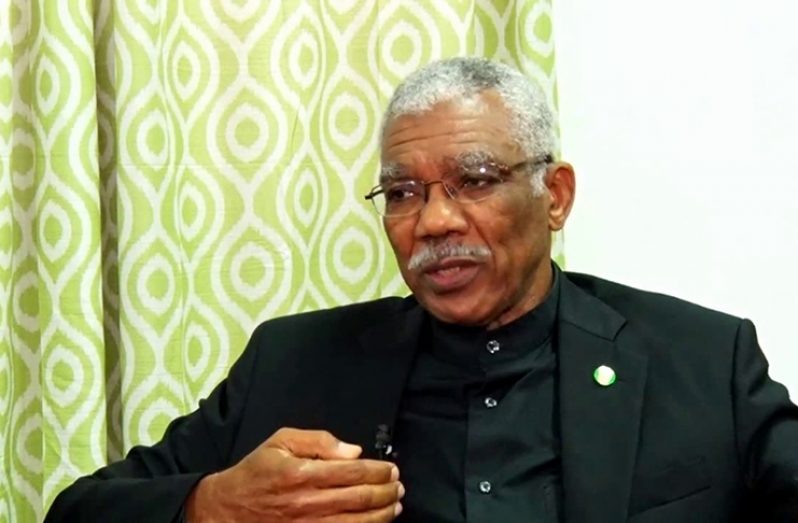–President Granger promises amnesty for current students in financial default
SHOULD the government be re-elected, current students of the University of Guyana (UG) in financial default can expect amnesty with the ushering in of free education from nursery to university.
President David Granger gave this assurance on Thursday in an interview with the Guyana Chronicle. However, he pointed out that it is unlikely that this move will cover for past students of UG, as government will be looking to the future.
“Now that we have decided to enforce what I would say is free education from nursery to university, we will ensure that new entrants, once they’re qualified, will enjoy the benefits of free education,” the President said.
“The question of compensation does not arise. We will examine – this is a matter for Cabinet – forgiveness or amnesty for persons who might be in default currently but the question of a wholesale amnesty is not being contemplated by Cabinet. I don’t want to prejudge what Cabinet will decide but we’re looking to the future and we’re looking forward.”
When the University of Guyana opened its doors on October 2, 1963, its annual tuition fee was $100 but this was later abolished.
In 1976, under former President Linden Forbes Sampson Burnham, all schools of the government were made free from nursery to university and this was enshrined as a right within the 1980 Constitution.
Article 27 of the Constitution states: “Every citizen has the right to free education from nursery to university as well as at non-formal places where opportunities are provided for education and training.”
Burnham reinforced the basis of universal primary and secondary education and moved tertiary education from being the privilege of an élite few to an entitlement for everyone.
CORNERSTONE
As Guyana’s first Prime Minister and Executive President and founder of the People’s National Congress (PNC), he believed that public education was the cornerstone of social justice.
He had announced in a broadcast to the nation, “Education is the cornerstone of equality and one of the chief instruments for the abolition of snobbery and the removal of discrimination.”
However, in the 1994-1995 academic year under the presidency of Dr. Cheddi Jagan, the university introduced a cost recovery programme and free tertiary education ended.
This meant that resident Guyanese students were now required to pay G$127,000 per annum while the fees were higher for non-resident Guyanese and foreign students.
The payment of fees was higher for those pursuing studies in law, medicine, nursing and tourism, where the fees were $300,000, $500,000, $251,000 and $158,000 respectively.
In recent times, he has explained that from 2020-2029, Guyana will have its own “Decade of Development” which will prioritise education, among other factors, as a means to end the cycle of intergenerational poverty.
Already, the incumbent government has been attempting to foster greater access to educational opportunities for citizens countrywide.
“I’m comfortable with the fact that we’re doing the best that we could with our resources and I think the pace will quicken when revenues start to come from petroleum,” the President said.
Meanwhile, efforts of the government over the years such as the creation of four regional towns and the announcement of plans to establish ‘A’ Grade secondary schools in each region, will further help to push improvement in education delivery.
MISTAKE
“It is always a mistake to separate children from parents; it even goes for educational purposes. In Guyana, it is a matter of necessity and I would like to do away with that by having children live and study in their region of residence,” the President said.
Added to this, the Head of State also wants to see more qualified teachers who are able to speak Indigenous languages, work within Indigenous communities where English may not be easily understood.
He stressed the point that children in the hinterland cannot be taught identical to children on the coastland as the two groups are exposed to different environment and experiences.
This vision expressed, he also took note of the challenge that some 80 per cent of teachers are females and many have young children who themselves are going to school.
“So, we have to build mechanisms to attract and retain teachers to work in the hinterland,” he said.
Apart from this, he committed to the continued improvement of stipends for teachers in the hinterland and expressed the need for the construction of additional buildings.
Regarding the latter, he said, “The whole idea of a child paddling to school in a … canoe, it looks pretty on the postcards but the child gets to school tired so we want to take education to the children.”
President Granger, through a programme started in observance of his birthday a few years ago, crafted the Public Education Transport System, which is also known as the 5Bs Programme.
The President asserted in September that, “Education is at the top of my list… education is the cornerstone of development. This is not a pipe dream; this is not an elections slogan. This comes from the supreme law of the land; this comes from the Constitution,”












